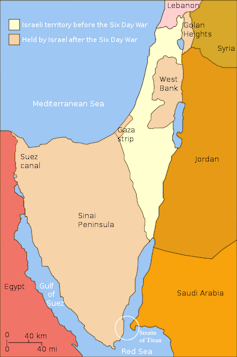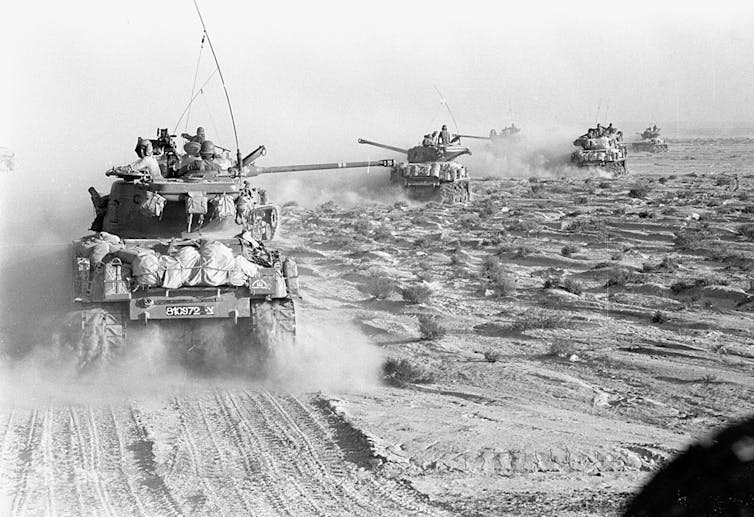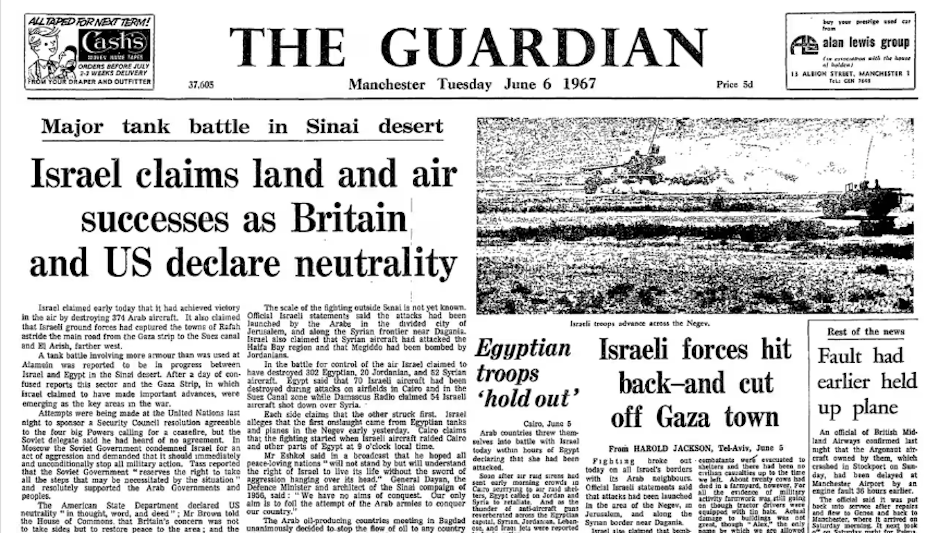Israel’s prime minister, Benjamin Netanyahu, describes his country’s war against Hamas as Israel’s “second war of independence”. The first was fought in 1948, but the war that gave Israel control of Gaza took place 19 years later.
The six-day war between Israel and its Arab neighbours in 1967 was fought amid intense superpower tension and vivid international fears that it might spread.
Having spent a career as a news journalist, often reporting from conflict zones, I now research UK newspaper coverage of major historical events. Printed newspaper archives from the time reveal prescience among UK correspondents covering the six-day war. Even in 1967, it seems, it was becoming clear that the conflict between Israelis and Palestinians – and between Israel and its Middle Eastern neighbours – had the potential to fester for decades.

From Tel Aviv, Charles Douglas-Home of The Times identified problems likely to arise from Israel’s military success. “Israel has won another battle”, he explained, “but who can say that she has won the war?” Douglas-Home predicted that the Jewish homeland would exist “in a cycle of eruption every decade” if it could not solve “the problem of the refugees”.
It was ironic, he suggested, that the refugee crisis had “become an internal matter whereas before it was studiously kept outside”. However, rapid Israeli advances had left 250,000 Palestinian refugees cut off from any escape into Egypt of which, until 1967, the Gaza Strip was part. Douglas-Home predicted that “a long-term internal security problem” now faced Israel.
Read more: Israel-Hamas war: six key moments for the Gaza Strip
John Dickie, the diplomatic editor of the mass circulation conservative Daily Mail recognised the global challenges. In the short term, the USSR would be weakened by the military failure of its proxies Egypt and Syria. However, he added, “Arab desires for revenge are likely to strengthen”. Dickie feared Israel’s neighbours would be determined to “qualify for nuclear status”.
Wishful thinking
On behalf its readership of Labour-supporting Britons, the Daily Mirror hoped that Israeli success could bring security for the region and the world. In a front-page editorial, the Mirror posed “the crucial questions”: would Russia and America work together to devise “a lasting political settlement?” Would “victorious Israel be prudent enough – despite her massive territorial conquests in the war – to be modest and generous in her political demands on the Arab states?”. Would “the Arabs jettison their fanatical delusion that Israel doesn’t really exist – and agree to exist side by side”?
The Mirror concluded that though Britain and America were Israel’s staunch supporters, they “cannot alone conjure Arab-Israel coexistence out of the blood on the sand”. Israel would have to show magnanimity in victory. It must grant the Arabs “peace and time and help to build their own prosperity”. Fighting again would be futile. Israel’s Arab enemies would soon learn that “the USSR does not back losers twice”.
For its highly educated readership, The Manchester Guardian’s Harold Jackson reported from Tel Aviv that the military victory was “unprecedented in modern times”. Israeli forces had won without external support “because they had the better army”. The equipment available to each side was similar, but “wars are won by men and the Israelis had the supreme advantage here”.
Jackson noted that Israel had not issued official casualty figures, only an assurance that they were “relatively light”. He reflected that: “Seeing line after line of Egyptian bodies in the Gaza strip makes one wonder what the Israeli losses are relative to.”

The Observer, owned in 1967 by the Astor family, offered additional sophistication. The balance of power in the Middle East had changed profoundly and fast. “Audacious generalship” and superior military efficiency had given Israel “a fantastic success”. Now “a steady nerve and proper self-assurance” would be essential if the Jewish state was to succeed in “the inherently much harder task of making a durable peace”.
Cold war in the Middle East
The Economist contributed understanding of the cold war context. If Egyptian president, Gamal Abdel Nasser, and his Syrian and Jordanian allies had won “the USSR would have acquired status and influence”. Moscow might have exploited this to put renewed pressure on America over its role in Vietnam. Instead Israel had prevailed. Now, any “final peace settlement would mean doing something about those refugees”.
The sophisticated weekly title acknowledged that the populations of Gaza and the West Bank “have been wilfully misused by the Arab governments”. Nevertheless, while terrorist groups should be expelled from the Gaza strip, in return for Arab recognition of its right to exist Israel must recognise the plight of those left stateless and destitute.
If the echoes from 1967 sound familiar 56 years later, we should acknowledge that this has long remained a smouldering conflict, never a frozen one. Keir Starmer would recognise the Labour Party dilemma described in 1967 by Nora Beloff, pioneering female political correspondent for the Observer.
Writing as the six-day war came to an end, Beloff predicted that the UK’s Labour prime minister, Harold Wilson, was going to have a hard time keeping his government and party together as peace was negotiated. Reluctant to recognise Israel after its establishment in May 1948, Labour remained “sharply divided” between pro-Arab and pro-Israeli MPs.
A similar dilemma confronts the opposition leader today as he tries to reconcile opposing views within his own party in parliament and beyond.

